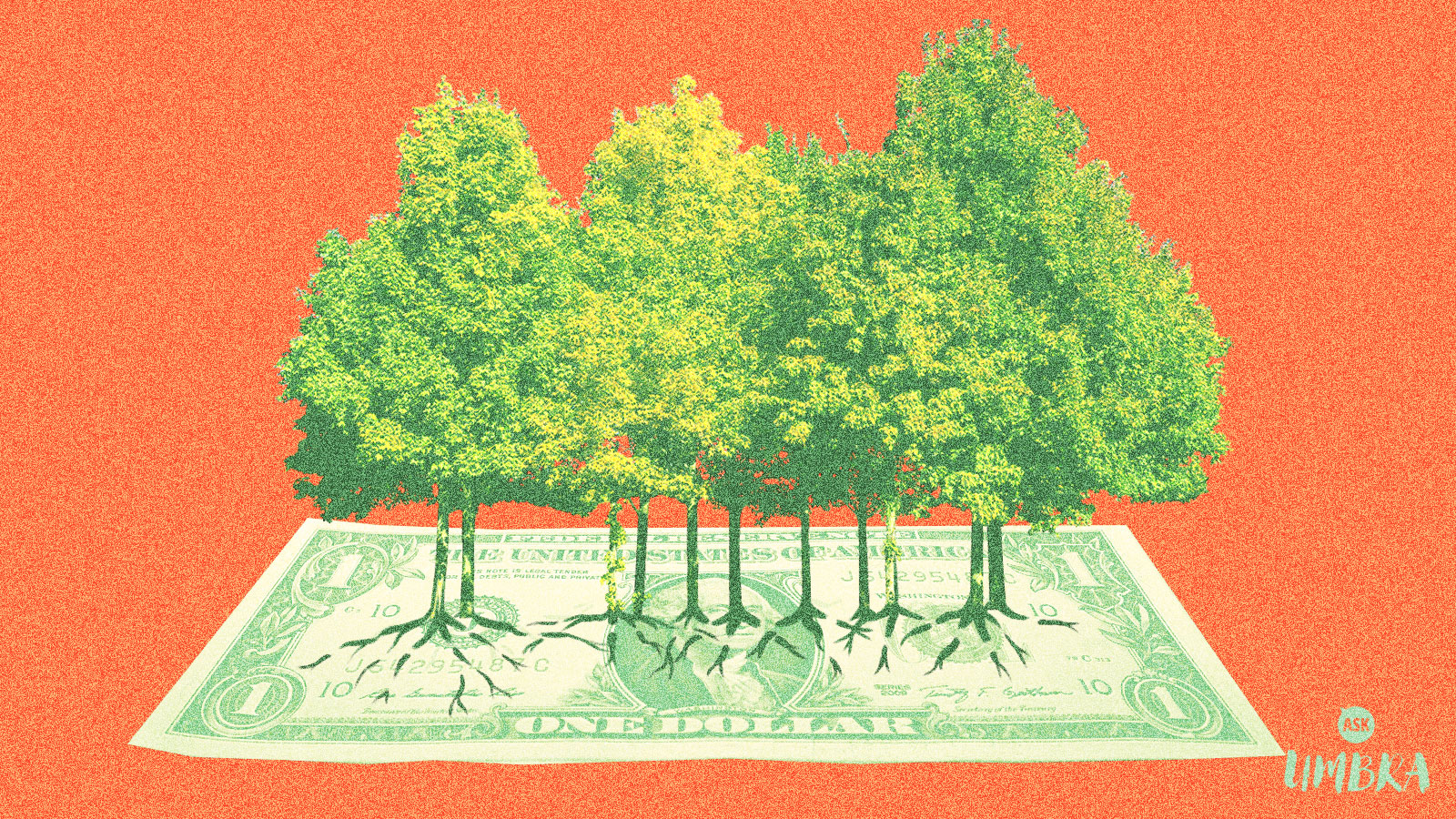Q. Dear Umbra,
How should I invest my money when I feel like the whole premise of the stock market is unsustainable and wildly unethical?
— Greed Emits Carbon, Kind Of
A. Dear GECKO,
This is an era in which the flaws of capitalism are being discussed by mainstream politicians, and the refrain “capitalism caused climate change” has become very popular. So when you say that “the whole premise of the stock market is unsustainable and wildly unethical,” you’re probably referring to the fact that its existence incentivizes an economy that is 100 percent profit-focused. The number one priority of publicly traded companies is to make money for their shareholders, and who really cares how it happens?
When Exxon discovered in the 1970s that the act of extracting and burning fossil fuels was causing irreversible climate change with certain detrimental effects, and just … kept doing it for decades more, because that’s its entire business model and it had yielded quite a comfy amount of cash for its executives and shareholders, was that capitalism? Yes. Was it free-market capitalism? Not really. Fossil fuels are subsidized by the government to the tune of $20 billion a year, and that’s not for the good of the American people; it’s for the good of fossil fuel companies and their shareholders.
So, who are these mystical shareholders for whom business execs are constantly trying to make money? If you invest in the stock market in any way — you have an IRA! A 401(k)! You invest in mutual funds or index funds! — you, friend, are a shareholder. And most people do invest in mutual funds or index funds — which bundle lots of stocks together to let people invest in a big chunk of the market all at once — because they’re the proven best way to grow your money. Individually picking out various stocks to throw money at is both rare and ill-advised. You’re probably not, like, a big shareholder, unless I’m writing to Warren Buffett or something, in which case: You’ve really had a change of heart, guy!
If the various companies that make up your mutual fund or index fund do well, you get some money. And if any of those companies are involved in fossil fuel extraction, then you made that money on climate change. And you may not even have known!
I’m going to answer your question as a business consultant would, GECKO, by establishing your priorities and advising you on the most effective way to achieve them. If your priority is ethical purity, and you’re fundamentally opposed to the stock market and capitalism writ large, then the obvious answer is to not invest at all. Of course, this will disadvantage you financially, which is kind of the whole conundrum of capitalism. In this economy, ethics and financial well-being almost always involve compromise!
If your priority is doing everything you can as an individual to mitigate climate change, ignoring the entire world of finance might actually not be the most productive choice. Because money is an enormously important factor for mitigating climate change; there is truly no way to construct any of the infrastructure or rehome any of the people who will be displaced or develop any carbon-saving technology without money. Especially not when we have eleven years to prevent global warming from surpassing 1.5 degrees C.
“Greening the banking sector is good and divesting from fossil fuels is good, but what you need is money to be directly invested into projects,” says Jeff Schub, executive director of the Coalition for Green Capital. “If we had 100 years, private capital markets might solve this. But we don’t.”
OK: So how do you get your money directly into projects that will address climate change? Let’s go over some options:
In another reality, you could invest in government bonds. If you wanted to grow your money a little bit, and you had faith in the federal government’s willingness to take action on climate change, I guess you could buy U.S. government bonds? A government bond is a loan that you make to the U.S. Treasury so that the federal government can do things like build infrastructure. It’s considered an extremely low-risk loan, so it has very low returns. But, at least at this point in history, you’d be investing in a fossil-fuel friendly federal government, which defeats the purpose. Another option is municipal bonds, which — depending on the municipality —might be a greener way to invest your money than federal bonds. But, ironically, climate change is beginning to make munis a riskier bet.
You can voluntarily invest in climate change-causing companies, with the goal of using your voice as an investor to make them better. There is an argument that shareholders can influence the companies they invest in to uphold better practices. In reality, individual shareholders of major companies do not have a significant enough stake to actually make their opinions matter. This is not your most effective option.
You can invest in “green” funds. Green funds are a type of “socially responsible” index or mutual fund that lets you invest in companies that are ostensibly pro-climate. Ian Monroe, the founder of the carbon-conscious fund creator Etho Capital, thinks green funds are an important tool for decarbonizing our economy. “Sustainable public index and equity investing is important, because the biggest pools of capital are in index funds,” he said. “To fix the system, we have to decarbonize, and a way to push in that direction now is to shift investment toward companies who are climate leaders in each industry.” Etho chooses the companies included in its fund by doing a full life cycle assessment of production, including the supply chain, which is a pretty rare degree of scrutiny.
Big investment houses like Vanguard and Charles Schwab know that there is a growing contingent of people who don’t want their money to go into the fossil fuel industry. To that end, there are a growing number of “green” funds offered by major brokerage firms that you can opt into.
But a lot of them are playing pretty fast and loose around the definition of “green.” For example, “green” could simply mean that big, known fossil fuel companies are excluded from a fund that includes all kinds of businesses that profit from fossil fuels in indirect ways. It could mean that fossil fuel companies that are attempting to break into renewables — without abandoning their oil holdings — are included. A lot of so-called “sustainable” companies are evaluated by metrics and goals that they report themselves, which isn’t always reliable. Basically, you’d need to review a full list of every company included in the fund to make sure it aligns with your goals — and keep an eye on fees, which can vary quite a bit from fund to fund.
You can get a loan from a commercial bank to green your house or your community yourself. This suggestion comes directly from Schub, and it’s pretty clever. If you want to be sure that capital is going to green infrastructure, take capital from a bank — it doesn’t matter which one! That’s the beauty of it! — and build that infrastructure yourself. Put solar panels on your house, or add insulation and other energy-efficiency features. It’s small scale, but you’ll be sure where that money is going — and it’ll increase the value of your property. This advice also applies to any business you own, if you do.
You can support green community banks. Green community banks exist to support climate-forward community projects through sometimes complicated mechanisms. For example, the Green Bank of Connecticut holds a pool of money explicitly to absorb losses when commercial banks provide low-interest, long-term loans to individuals to undertake climate mitigation and adaptation projects. This is where things get a little tricky; with most green community banks, you can’t just walk up to them and open an account. (The Clean Energy Credit Union in Colorado, which is a rare exception, takes deposits from individuals and invests them in — you guessed it! — clean energy projects.) However, if you take advantage of the kinds of projects that green community banks fund, you’re proving that there is demand for their services.
You can get the government on board with decarbonizing capital markets!!!! You knew we were gonna get here eventually! Earlier, we addressed the myth that we live in a purely capitalist society, considering that a good deal of the “oppressive government regulation” that hyper-conservatives are always hooting about is actually going to make fossil fuels profitable.
Anyway, what if instead of directly incentivizing fossil fuel use, your representatives were more involved in incentivizing climate mitigation? Bazinga! That could look like developing green community banks, like we just talked about, or starting a national green bank, which is something that exists in Australia and Japan. It was even proposed in the U.S. Congress in 2009.
At the very, very, very, very least, vote out those guys (and ladies!) who keep passing backwards legislation subsidizing fossil fuel companies. Let fossil fuels age gracefully, you disrespectful fools! And by “age gracefully,” I mean “die.”
Capitally,
Umbra




